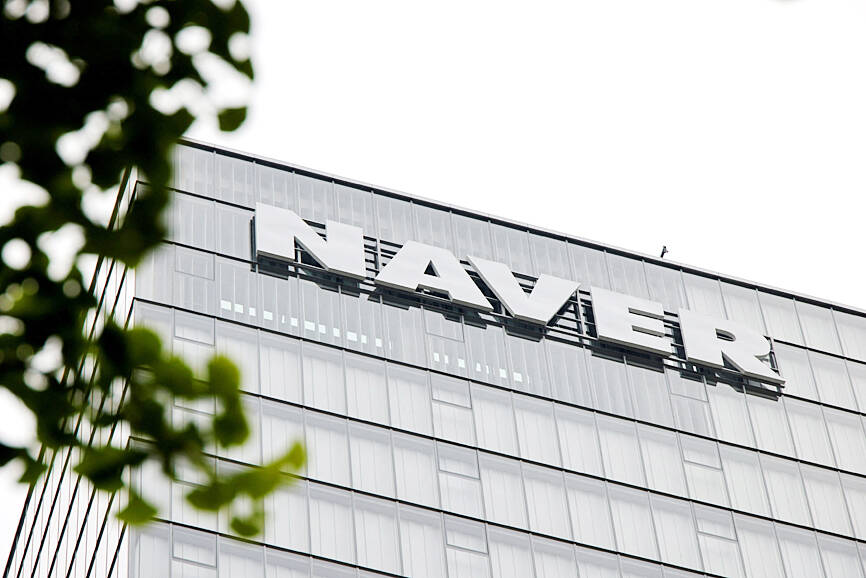Seoul has urged Tokyo not to discriminate against South Korean companies, the South Korean Ministry of Foreign Affairs said yesterday, after reports that technology giant Naver Corp is under pressure to sell its stake in Japan’s top messaging app.
South Korea’s Naver developed Line 13 years ago and now has more than 95 million users. It is also popular in Taiwan and Southeast Asia.
The app is operated in Japan by LY Corp, which is majority-owned by A Holdings, a joint venture between Naver and Japanese investment firm Softbank Group Corp.

Photo credit: REUTERS
Japanese reports last week said that Tokyo had demanded LY Corp review its relationship with Naver, with the Kyodo news agency saying Softbank was in talks to buy Naver’s LY Corp shares.
“We maintain a firm stance that there should be no discriminatory measures against South Korean companies,” the ministry said in a statement.
The South Korean government plans to discuss the matter with Naver “if necessary,” it said.
Line has been under scrutiny in Japan over a data leak involving more than 500,000 records last year, which prompted the Japanese Ministry of Internal Affairs and Communications to issue administrative guidance.
Line’s “strong dependence on Naver in terms of systems and network configuration” was among the causes of the leak, the Nikkei reported the ministry as saying.
“This relationship has also made it difficult for your company to demand appropriate safety measures from Naver and to implement proper management,” it said, referring to LY Corp.
One of South Korea’s biggest technology companies, Naver, and its myriad services — including Google-like maps, financial services similar to Apple Pay, and popular blogs and chat forums — are used daily by many South Koreans.
The unfolding situation is a “mismatch” for South Korean President Yoon Suk-yeol, who has been trying to improve ties with Japan in the face of military threats from North Korea, Sejong University business professor Kim Dae-jong said.
“Under global standards, countries do not demand companies forsake their shares — just like we don’t demand Facebook sell theirs over privacy concerns. Japan should follow such standards,” Kim said.
However, Seoul is not in position to block the deal as it does not involve national security, he said.
Naver declined to comment.

Intel Corp chief executive officer Lip-Bu Tan (陳立武) is expected to meet with Taiwanese suppliers next month in conjunction with the opening of the Computex Taipei trade show, supply chain sources said on Monday. The visit, the first for Tan to Taiwan since assuming his new post last month, would be aimed at enhancing Intel’s ties with suppliers in Taiwan as he attempts to help turn around the struggling US chipmaker, the sources said. Tan is to hold a banquet to celebrate Intel’s 40-year presence in Taiwan before Computex opens on May 20 and invite dozens of Taiwanese suppliers to exchange views

Application-specific integrated circuit designer Faraday Technology Corp (智原) yesterday said that although revenue this quarter would decline 30 percent from last quarter, it retained its full-year forecast of revenue growth of 100 percent. The company attributed the quarterly drop to a slowdown in customers’ production of chips using Faraday’s advanced packaging technology. The company is still confident about its revenue growth this year, given its strong “design-win” — or the projects it won to help customers design their chips, Faraday president Steve Wang (王國雍) told an online earnings conference. “The design-win this year is better than we expected. We believe we will win

Chizuko Kimura has become the first female sushi chef in the world to win a Michelin star, fulfilling a promise she made to her dying husband to continue his legacy. The 54-year-old Japanese chef regained the Michelin star her late husband, Shunei Kimura, won three years ago for their Sushi Shunei restaurant in Paris. For Shunei Kimura, the star was a dream come true. However, the joy was short-lived. He died from cancer just three months later in June 2022. He was 65. The following year, the restaurant in the heart of Montmartre lost its star rating. Chizuko Kimura insisted that the new star is still down

While China’s leaders use their economic and political might to fight US President Donald Trump’s trade war “to the end,” its army of social media soldiers are embarking on a more humorous campaign online. Trump’s tariff blitz has seen Washington and Beijing impose eye-watering duties on imports from the other, fanning a standoff between the economic superpowers that has sparked global recession fears and sent markets into a tailspin. Trump says his policy is a response to years of being “ripped off” by other countries and aims to bring manufacturing to the US, forcing companies to employ US workers. However, China’s online warriors